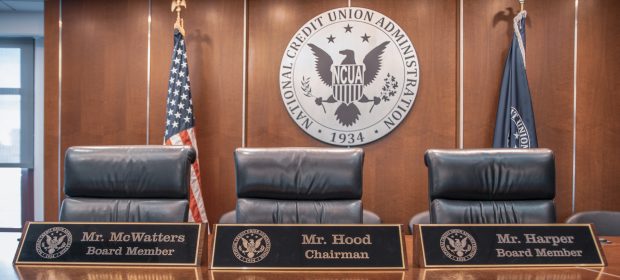 The NCUA Board (Source: NCUA)
The NCUA Board (Source: NCUA)
The NCUA intends to comply "in spirit" with a new and controversial Office of Management and Budget policy that could give President Trump direct control over independent agency rules and guidance.
That new policy, outlined in a memo last month, requires independent agencies to submit proposed rules and guidance to OMB before they are issued. And it requires that the submission contain a cost-benefit analysis.
Recommended For You
The Congressional Research Service this week issued a report saying that the new policy would give the Trump Administration unprecedented power over federal regulatory agencies.
In its first comment on the new policy, the NCUA said that it is agency policy to comply with such memos or orders when it can.
The agency, said in a statement sent to CU Times, "As long as an executive order or executive memorandum does not compromise the mission of the agency or the safety and soundness of credit unions, the NCUA Board has a long practice of complying in spirit with such orders and memoranda, even when they do not apply to independent regulatory agencies like the NCUA."
The agency declined to comment on whether it conducts cost-benefit analyses on rules or guidance.
In its report, CRS said that the independent agencies were designed to be at least partially free from presidential control. OMB has changed that relationship, CRS said, in its analysis of the memo, which became effective May 11.
The new policy could give OMB and the president "greater influence over the content and timing of [independent agency rulemaking] by establishing a new process in which presidential policy preferences could potentially play a role," CRS said.
The report continued, "If policy preferences do play a role in [OMB's]review—for example, if [OMB] does not allow an agency to move forward with a rule because it is not in alignment with the President's policy preferences—it could affect the independence of [independent agencies], which are statutorily designed by Congress to have their policymaking insulated from partisan politics and overt presidential influence."
CRS is a legislative agency that provides Congress with policy and legal analysis.
When the OMB's Office of Information and Regulatory Affairs was established, President Reagan's decision to require independent agencies to submit rules for review "is widely understood to have been out of respect for Congress's decision to make those agencies independent," CRS said.
At least one NCUA board member may not be happy with the agency's decision. After the OMB memo was issued, new Democratic NCUA board member Todd Harper last month made comments asserting the agency's independence.
"The Congress deliberately established the NCUA as a bipartisan, independent agency, and gave the board members six-year terms in order to insulate the agency's decision-making process from transitory political winds," the Democrat said, in his first remarks as a board member. "That decision by the Congress has served our nation, and the credit union community, well in both good economic times, and bad, and will continue to do so in the future."
In addition, several former NCUA board members told CU Times that the new policy will significantly alter the agency's rulemaking process and could delay new rules indefinitely.
© 2025 ALM Global, LLC, All Rights Reserved. Request academic re-use from www.copyright.com. All other uses, submit a request to [email protected]. For more information visit Asset & Logo Licensing.







